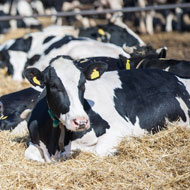
Panel sets out series of measures to reduce number of animals killed
European Food Safety Authority (EFSA) experts have explored issues surrounding the slaughter of pregnant farmed animals in the European Union.
According to the experts, on average three per cent of dairy cows, 1.5 per cent of beef cattle, 0.5 per cent of pigs, 0.8 per cent of sheep and 0.2 per cent of goats in the EU are slaughtered during the final third of gestation.
Reasons for killing the animals can vary - from farmers not being aware that animals are pregnant, to concerns over animal health and welfare or the economy.
An EFSA panel on Animal Health and Welfare first looked at whether and when livestock foetuses experience pain. They agreed that the animals don’t in the first two-thirds of gestation because the relevant physical and neurological structures only develop during the last phase.
The scientists then predicted the probability that foetuses experience pain during the last stage of gestation. They deduced that the most likely scenario is that they don’t because the body of the foetus contains a series of inhibitory mechanisms.
Following the assessment, the panel set out a series of measures to reduce the number of pregnant animals slaughtered.
The measures call for an improvement in the health of animals, therefore reducing slaughter for such reasons as animal sickness. They also call on farmers to implement management practices such as single-sex housing and supervised breeding.
The scientific opinion follows a request from Germany, Denmark, Sweden and the Netherlands. It is hoped that the insights will now be used by risk managers across the EU.
A full summary of the main conclusions is available at www.efsa.europa.eu



 The Veterinary Medicines Directorate (VMD) is inviting applications from veterinary students to attend a one-week extramural studies (EMS) placement in July 2026.
The Veterinary Medicines Directorate (VMD) is inviting applications from veterinary students to attend a one-week extramural studies (EMS) placement in July 2026.